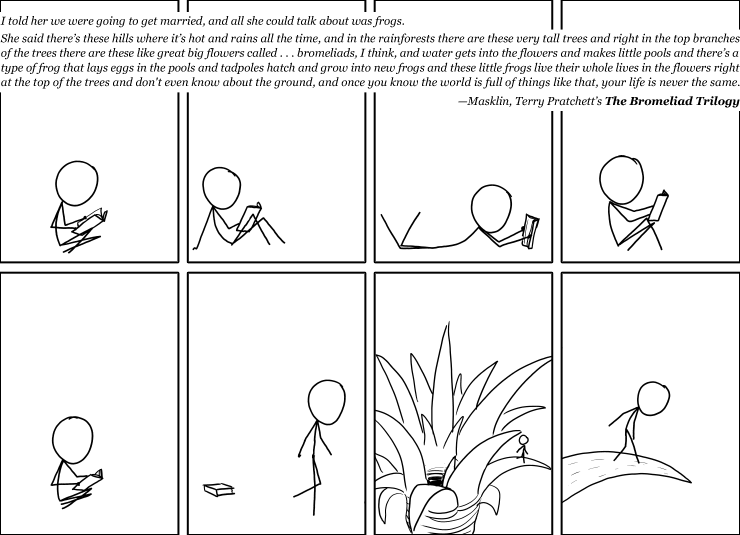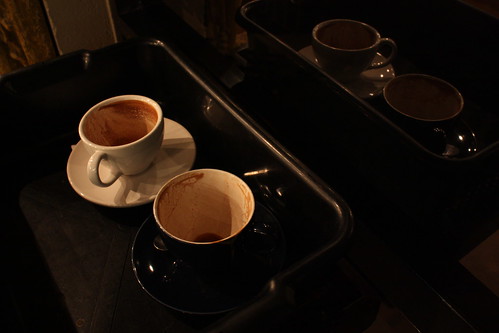last week, my time was taken up by another academic conference.
I presented on semi-academic podcasts and how awesomely they seem to cultivate discussions about scholarly things for the consumption (and perhaps participation) of non-scholarly audiences. such a thing seems pretty rare, but maybe it's less rare than I'm making it out to be. after all,
“Podcasting’s bridging of knowledge barriers in an intimate manner is one of its key, and most readily apparent, properties. Thanks to the medium’s wide accessibility— given its general affordability and portability— knowledge in diverse domains can be shared by individuals and groups around the world. Thanks, as well, to their intimate, personal and often-conversational natures, podcast episodes can help individuals of different educational levels cross disciplinary boundaries easily. Audience members need not be enrolled in an educational system in order reap their benefits” (Swiatek, 2018, p. 177-178).
how's that for a minimalist literature review, eh? Swiatek's chapter is in the collection I used as a textbook for my introductory podcast course last year. good stuff.
bridging knowledge barriers can happen across all kinds of lines, not just those of formal higher education, of course. academia is only one of many domains of learning.
but for my presentation, I concocted a fairly narrow set of criteria for the four examples I showcased. to fit in properly with what I wanted to talk about, the podcast needed to be...
- officially made by/with credentialed, institutionally-affiliated academics
- making use of the ethos and/or expertise of their degrees at least a little
- purposefully talking to and/or translating for non-academic audiences to some extent
I also limited my examples to humanities/communication-y topics, because that's my discipline, and a 15-minute conference talk cannot be much more comprehensive than that anyway. I am curious to look at other podcasts in this vein though. eventually. Huberman Labs would count. and probably plenty of others I haven't heard of yet.
my observation, as a fairly high level podcast fangirl, has been that most scholarly podcasts don't bother talking beyond their own discipline, much less beyond the academy in general. in a sense, that might be what "scholarly" means-- by, for, and of scholars. but I also knew of a few counter-examples. a few podcasts that managed to feel more openly, accessibly, publicly academic.
for this little starting-place of a conference talk, I looked at these four: Material Girls; Lingthusiasm; Think Fast, Talk Smart; and Professors Play.
according to my proposal for the event, I wanted "to highlight these as particularly valuable examples of public scholars demonstrating from the ivory tower how playfulness, connection, and personality are key ingredients for learning, teaching, and thriving as 21st-century humans."want to see my little digital handout with transcribed bits from each show? there's a link to my slides from there too, which in turn have a few painstakingly chosen, hopefully entertaining-ish, audio clips.
it is perhaps silly to turn my little presentation from last week into a blog post here, but (now that I'm halfway through doing it anyway) it does seem to match the spirit of my whole point— academia doesn't need to keep all of its cool conversations to itself.
on top of making that point, my other goal with the talk was to have fun introducing whoever showed up at my 11:00am panel to a few very engaging podcasts. I called it "Public Scholarship as Playful Pedagogy," but the title easily could've been shuffled into “Playful Scholarship as Public Pedagogy”— I'm still not sure which sounds better. the lines between all these things are fairly slippery at the best of times.the lofty version of my whole argument is something like this: podcasts are conversations, usually quite public ones that can shape the cultures and communities of the world we live in. sometimes they even create new communities, which in turn have their own world-shaping power. so it matters who gets to be part of the conversation. it matters how the conversations are designed.
Computers & Writing is one of the best conferences. next year it'll be in Athens, Georgia. will I get to be there and keep talking about podcasts as scholarship or pedagogy or public pedagogical artifacts or anything like that? we shall see.
















































